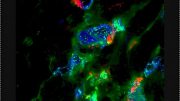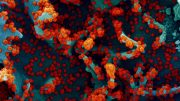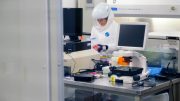
Hong Kong trial shows that a two-week antiviral therapy with interferon beta-1b, lopinavir-ritonavir, and ribavirin is safe and effective in reducing viral shedding in COVID-19 patients with mild to moderate illness.
- First evidence that early treatment with triple antiviral therapy of interferon beta-1b, lopinavir-ritonavir, and ribavirin — alongside standard care — is safe and shortens the duration of viral shedding compared to lopinavir-ritonavir alone (average 7 days vs 12 days), in patients with mild to moderate COVID-19.
- The authors say that larger phase 3 studies in critically ill patients are needed to confirm whether this triple regimen can provide clinically meaningful benefits.
A two-week course of antiviral therapy with interferon beta-1b plus lopinavir-ritonavir and ribavirin, started within 7 days of showing COVID-19 symptoms, is safe and more effective at reducing the duration of viral shedding than lopinavir-ritonavir alone in patients with mild to moderate illness, according to the first randomized trial of this triple combination therapy involving 127 adults (aged 18 and older) from six public hospitals in Hong Kong.
These early but important findings, published in The Lancet, do not include severe cases of COVID-19, and the authors stress the need for larger phase 3 trials to examine the effectiveness of this triple combination in critically ill patients.
Secondary outcomes (planned outcome measures that are not as important as the primary outcome measure, but are still of interest in evaluating the effect of an intervention [2]) in the new study suggest that clinical improvement and length of hospital stay may be significantly shorter in people treated with triple combination less than 7 days after showing symptoms, compared to lopinavir-ritonavir alone.
Experience with influenza, which has a high viral load (how much virus is present in an infected person’s body) around the time symptoms appear, suggests that treating hospitalized patients with a combination of multiple antiviral drugs may be more effective than single drug treatments, and minimize the risk of antiviral resistance. The authors hypothesized that this could be a possible therapeutic approach for COVID-19, in which the viral load also peaks around the time of symptom onset.
“Our trial demonstrates that early treatment of mild to moderate COVID-19 with a triple combination of antiviral drugs may rapidly suppress the amount of virus in a patient’s body, relieve symptoms, and reduce the risk to health-care workers by reducing the duration and quantity of viral shedding (when the virus is detectable and potentially transmissible). Furthermore, the treatment combination appeared safe and well tolerated by patients”, says Professor Kwok-Yung Yuen from the University of Hong Kong who led the research. [1]
He continues, “Despite these encouraging findings, we must confirm in larger phase 3 trials that interferon beta-1b alone or in combination with other drugs is effective in patients with more severe illness (in whom the virus has had more time to replicate).” [1]
Previous research found that a combination of oral lopinavir-ritonavir (normally used to treat HIV) and ribavirin (an oral hepatitis C virus drug) significantly reduced respiratory failure and death in patients hospitalized with the severe acute respiratory syndrome (SARS) during the 2003 outbreak [3]. Interferon beta-1b, which was developed to treat multiple sclerosis (MS), has been shown to reduce viral load and improve lung problems in animal studies of Middle East respiratory syndrome (MERS) coronavirus infection.
The open-label study enrolled 127 adults (average age 52 years) admitted to one of six public hospitals with laboratory-confirmed SARS-CoV-2 infection between February 10 and March 20, 2020 [4]. In Hong Kong, everyone who tests positive for COVID-19 is admitted to a hospital.
Participants were randomly assigned to 14 days of either the triple combination of oral lopinavir-ritonavir (400mg/100mg) and ribavirin (400mg) every 12 hours, plus up to three doses of injectable interferon beta-1b (8 million international units) on alternate days for patients admitted to hospital less than 7 days from symptom onset [5] (86 patients; combination group); or lopinavir-ritonavir alone every 12 hours (41 patients; control group).
In the trial, all patients received standard care including ventilation support, dialysis support, antibiotics, and corticosteroids. The average number of days from symptom onset to start of study treatment was 5 days.
During the study, the researchers looked at the clinical course of symptoms, and changes in laboratory findings (eg, blood examinations, chest x-rays) and viral shedding with regular molecular testing for viral load in nasopharyngeal swab, posterior oropharyngeal saliva, throat swab, stool, and urine (see table 2 for full list). All participants had a SARS-CoV-2 positive nasopharyngeal swab at the start of the study.
The primary endpoint was time to a nasopharyngeal swab negative for SARS-CoV-2. Secondary outcomes included time for symptoms of COVID-19 to go defined as achieving a National Early Warning Score (NEWS) score of 0; a Sequential Organ Failure Assessment (SOFA) score of 0, indicating normal function; 30-day mortality; and length of hospital stay.
Treatment with the triple drug combination effectively suppressed viral load (with no detectable virus) in the nasopharyngeal swab within an average 7 days of starting treatment, which was significantly shorter than the average 12 days in the control group, treated with lopinavir-ritonavir alone (table 2).
Secondary outcomes supported the findings, indicating that clinical improvement was significantly better in the triple combination group–with the triple therapy halving the time to complete alleviation of symptoms (average 4 days vs 8 days) and a SOFA score of 0 (average 3 days vs 8 days), and resulting in significantly shorter average hospital stay (9 days vs 14.5 days).
Further secondary analyses also looked at the timing of treatment and patient outcomes. They found that the 52 patients who started combination treatment (with interferon beta-1b) less than 7 days after the onset of symptoms had better clinical and virological outcomes than the control group who received their treatment at the same time (24 patients; table 3). However, people who were treated 7 days or more after showing symptoms there was no difference in outcomes between the combination treatment and control groups (34 patients in the combination group, who received lopinavir-ritonavir and ribavirin but did not receive interferon beta-1b, and 17 in the control group) [5].
“These findings suggest that interferon beta 1-b may be a key component of the combination treatment and is worth further investigation for the treatment of COVID-19”, says co-author Dr. Jenny Lo from Ruttonjee Hospital in Hong Kong. “Interferons are naturally occurring proteins, produced in response to viral infection, and the hope is that interferon beta-1b will boost the body’s ability to fight SARS-CoV-2. Future phase 3 trials will soon confirm or refute the usefulness of this candidate drug as a backbone treatment for COVID-19.” [1]
There was no difference in adverse events between the treatment groups (48%; 41/86 patient combination group vs 49%; 20/41 controls), and none of the side effects in the combination group were severe. One patient in the control group had a serious adverse event of liver dysfunction, and discontinuation treatment. The most common adverse events were diarrhea, fever, and nausea (table 4). No patients died during the study.
The authors highlight several limitations of the study, including that it was an open-label study in which both the researchers and the patients knew the treatment the participants were receiving, and did not have a placebo group. They also note that the findings may be confounded by the subgroup of 34 patients within the combination group who were admitted 7 days or more after symptom onset, and were not offered interferon beta-1b, but were analyzed as part of the combination group.
Writing in a linked Comment, Dr. Sarah Shalhoub (who was not involved in the study) from Western University in Canada says: “Most published studies so far have been retrospective or observational. Therefore, this prospective, randomized controlled design adds notable value to the growing evidence on treatments, eliminating a number of limitations inherent to retrospective studies.”
She continues, “This study presents a step towards finding a much-needed therapy for SARS-CoV-2. However, as the authors acknowledge, future studies to examine the efficacy of interferon beta-1b alone or in combination with other drugs to treat severe or critically ill patients with confirmed COVID-19 compared with placebo are warranted.”
Reference: “Triple combination of interferon beta-1b, lopinavir–ritonavir, and ribavirin in the treatment of patients admitted to hospital with COVID-19: an open-label, randomised, phase 2 trial” by Prof Ivan Fan-Ngai Hung, MD; Kwok-Cheung Lung, FRCP; Eugene Yuk-Keung Tso, FRCP; Raymond Liu, FRCP; Tom Wai-Hin Chung, MRCP; Man-Yee Chu, MRCP; Yuk-Yung Ng, MRCP; Jenny Lo, MRCP; Jacky Chan, MRCP; Anthony Raymond Tam, MRCP; Hoi-Ping Shum, MD; Veronica Chan, FRCP; Alan Ka-Lun Wu, FRCPath; Kit-Man Sin, FRCP; Wai-Shing Leung, MRCP; Wai-Lam Law, FRCP; David Christopher Lung, FRCPath; Simon Sin, FRCP; Pauline Yeung, MRCP; Cyril Chik-Yan Yip, PhD; Ricky Ruiqi Zhang, PhD; Agnes Yim-Fong Fung, BSc; Erica Yuen-Wing Yan, MSc; Kit-Hang Leung, MSc; Jonathan Daniel Ip, MSc; Allen Wing-Ho Chu, MSc; Wan-Mui Chan, PhD; Anthony Chin-Ki Ng, BSc; Rodney Lee, FRCPA; Kitty Fung, FRCPA; Alwin Yeung, FRCP; Tak-Chiu Wu, FRCP; Johnny Wai-Man Chan, FRCP; Wing-Wah Yan, FRCP; Wai-Ming Chan, FRCP; Jasper Fuk-Woo Chan, MD; Albert Kwok-Wai Lie, FRCP; Owen Tak-Yin Tsang, FRCP; Vincent Chi-Chung Cheng, MD; Tak-Lun Que, FRCPath; Prof Chak-Sing Lau, MD; Kwok-Hung Chan, PhD; Kelvin Kai-Wang To, MD and Prof Kwok-Yung Yuen, MD, 8 May 2020, The Lancet.
DOI: 10.1016/S0140-6736(20)31042-4
The study was funded by The Shaw-Foundation, Richard and Carol Yu, May Tam Mak Mei Yin, and Sanming Project of Medicine. It was conducted by researchers from Queen Mary Hospital, Hong Kong SAR, China; The University of Hong Kong, Hong Kong SAR, China; Pamela Youde Nethersole Eastern Hospital, Hong Kong SAR, China; United Christian Hospital, Hong Kong SAR, China; Ruttonjee Hospital, Hong Kong SAR, China; Queen Elizabeth Hospital, Hong Kong SAR, China; Tuen Mun Hospital, Hong Kong SAR; and Princess Margaret Hospital, Hong Kong SAR, China.
[1] Quotes direct from authors and cannot be found in the text of the Article.
[2] https:/
[3] https:/
[4] Patients were recruited from the Queen Mary Hospital, Pamela Youde Nethersole Hospital, Ruttonjee Hospital, United Christian Hospital, Queen Elizabeth Hospital, and Tuen Mun Hospital in Hong Kong.
[5] Within the combination group, 52 patients were admitted to hospital less than 7 days from symptom onset and received the lopinavir-ritonavir, ribavirin, plus interferon beta-1b regimen, and the 34 patients who were admitted 7 days or more after symptom onset received only lopinavir-ritonavir and ribavirin because of the possible proinflammatory side-effects of interferon beta-1b as patients’ immune systems start to respond after the first week to try to clear the virus, which can cause cytokine proinflammatory responses (figure 1).









Be the first to comment on "New Triple Antiviral Drug Combination Shows Promise for Treating COVID-19"